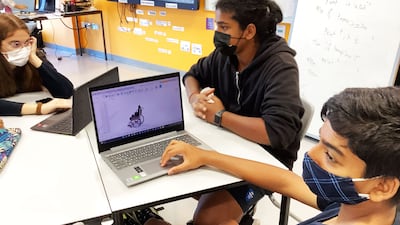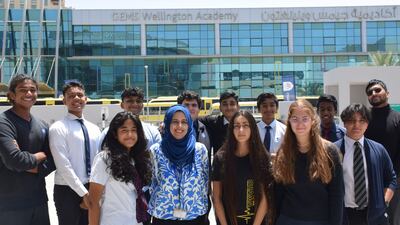A group of 13 UAE pupils have scooped a top competition prize of $25,000 for designing a self-driving wheelchair for the elderly.
The design — described by the pupils as the "Tesla of wheelchairs" — aims to help people to navigate certain environments such as malls.
The pupils overcame competition from 20 schools in 14 countries to triumph in 'Otis’ Made to Move Communities Challenge' in the Europe, Middle East and Africa region. Otis is a global manufacturer of lifts and escalators and the theme of its challenge this year focused on mobility solutions for the ageing population.
The pupils, aged between 14 and 17, study at Gems Wellington Academy - Silicon Oasis in Dubai and their prize money will be used to improve science, technology, engineering and maths facilities at the school.
"We wanted to create a product that will help the ageing population in the UAE," said Tarun Chandra, 17, an Indian grade 12 pupil.
"We focused on shopping malls as they are very large and hard to navigate for the elderly, especially independently. We did take a lot of inspiration in terms of the [autonomous] drive sector, so you could say it's very autonomous, it's very self-capable. It's also easy to use. That's why you could call it the Tesla of wheelchairs."

Their proposed design can avoid obstacles, detect crowds, and plan a route to a shop.
The user only has to key in the store location to a map on the chair and it will navigate them to their location.
Pupils visited local malls, interviewed the elderly and researched UAE statistics as part of the project. More work needs to be done to develop a physical prototype.
"We're looking to develop the idea a little more," Tarun added. "But I'm sure in the future, if the opportunity arises, we can definitely create a physical prototype of the wheelchair, and then pitch it to investors.
"We feel very proud. We put a lot of work into this project over the three months. So it feels really good to have won. I definitely feel like we deserved it."
The pupils participated in many brainstorming sessions over the past term, and then merged the best of their suggestions to come up with the design.
Another member of the winning team, Matthew Andreopoulos, 17, an Australian grade 12 pupil, said the competition had been a great journey. The team spent eight weeks working with mentors at Otis. Each team then virtually presented their ideas to a panel of regional Otis leaders, who evaluated the presentations.

"Winning was so rewarding since we worked so hard over the over the last term," Matthew said.
Other ideas ranged from smart escalators to an emergency call device, but Mohammed Al Qaisi, managing director at Otis Gulf, was particularly impressed by the Gems team's work.
“Through the programme, we are engaging young minds to imagine new mobility solutions for a growing elderly population within the communities in Dubai," Mr Al Qaisi said.
"Gems Wellington Academy – Silicon Oasis team did a remarkable job in identifying and addressing everyday mobility challenges and ensuring a more diverse and inclusive mall experience for the aged."
Shafaque Riaz, head of information and communications technology at the school, said the challenge required students to put themselves in the elderly's shoes.
“This opportunity helped our pupils to develop research and communication skills, technical understanding of the navigation, browsing and safety systems required," Ms Riaz said.
"[They were then] able to apply these skills to address a real-world problem."







